
Some 20 years ago, villagers around Zambia's North Luangwa National Park made much of their income by hunting down the park's elephants and rhinos for meat, ivory and horns. Today, poaching has been drastically curbed, and villages are thriving — thanks to the efforts of a perennially smiling but fiercely determined Zambian agronomist named Hammerskjoeld, or Hammer, Simwinga.
Simwinga, 44, has nurtured hundreds of community-based ventures — ranging from fish-farming and beekeeping to the production of sunflower oil — that showed thousands of villagers how to prosper without poaching. The North Luangwa Wildlife Conservation and Community Development Programme, which he runs, grew out of an organization started in 1986 by two American wildlife biologists, Delia and Mark Owens. When Simwinga arrived on the scene several years later, Delia recalls, she was won over by his easy charm in dealing with people and problems. "There's something about Hammer that's magical," she says. "When everything is crumbling around him, he just stands there with a smile on his face and says, 'We can do this.'"
Not everybody was happy about his work. While the Owenses were in America in 1996, corrupt officials, angry to see their lucrative bush-meat and ivory sources dry up, raided the program's office, seizing vehicles and equipment. The Owenses were warned not to return and, with them gone, funders withdrew support. But for Simwinga, giving up was not an option. "I have seen the most disadvantaged people regain their joy of life," he says. Undeterred, he started regularly walking 20 miles or more a day to supervise projects in villages throughout the park.
A decade later, the results of his efforts are plain. Based on interviews with former poachers, the organization estimates that the project has boosted the income of its roughly 35,000 participants a hundredfold. Through the project, 64 different villages have gained access to microcredit and training, enabling them to set up grinding mills and sunflower-oil presses, and to launch sewing and carpentry businesses. Today, 86% of participants eat three meals a day, compared with just 20% in 1986.
Even with poaching now more or less under control in the North Luangwa National Park, its environmental problems persist: an increasing human footprint is reducing wildlife habitat, while drought and climate change present new threats to precarious livelihoods. Simwinga's dream is to launch a research and training center where locals learn to participate in conservation and development — particularly sustainable tourism — that would help preserve the park's wildlife. "I will die a happy man," he says, "if I can leave such an institution in my community."